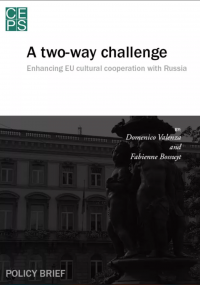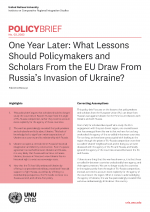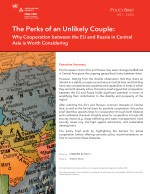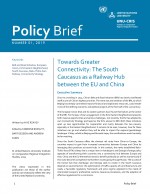A Two-Way Challenge: Enhancing EU Cultural Cooperation with Russia

At a time of cooling relations, culture is arguably the European Union’s most powerful instrument to shape positive long-term relations with Russia. Against a convoluted international and domestic background, EU cultural action in the country is at present supported through a variety of financial instruments and programmes. Stakeholders and cultural operators agree that EU engagement in the cultural sphere plays a vital role in breaking civil society isolation and fostering long-term openness in Russia. However, in spite of considerable improvements, EU action in the cultural realm has still underutilised potential. To help the EU overcome this and thus unleash the transformative potential of culture, this policy brief proposes the following:
- The EU should develop a country-based strategic approach to the role of culture in external relations with Russia. Building on the recently developed EU strategic approach to international cultural relations and drawing inspiration from the policy towards the Western Balkans, this new document should enhance EU ambitions and adjust current policies to the aspirations and needs of cultural operators and local authorities.
- This country-specific strategy should involve Russian public authorities as partners, with a focus on local administrations and higher education institutions (HEIs), leading to a two-way and mutual approach to cultural relations. This rests on the principle that, without their involvement, EU cultural action in Russia is limited in scope.
- Increased focus on mutuality should lead to adopting ‘cultural cooperation’ as a suitable label to refer to cultural action in Russia, instead of the currently used terms ‘international cultural relations’ and ‘cultural diplomacy’.
- EU member states should agree on a bilateral framework on cultural cooperation and on a new programme co-funded by both the EU and Russia. This could be pursued in the framework of the new Creative Europe programme (2021-2027).
- Within Cross-Border Cooperation (CBC) programmes, funding to support cultural initiatives should be increased and diversified, allowing non-public entities to benefit from a larger share of funding than the current framework allows. This could be done with specific calls for proposals targeting civil society organisations (CSOs) working in the arts, tourism, cultural heritage, and education.
- At the same time, more flexible requirements should be adopted to broaden the boundaries of civil society and thus involve entities other than CSOs in the cultural field (e.g. non-registered organisations, for-profit entities, individuals and artists).
- Support for smaller projects (under €50,000) should be increased within CBC programmes.
- CBC programmes should all adopt a 2-step submission of concept notes and full applications to ease the administrative burden of smaller organisations.





